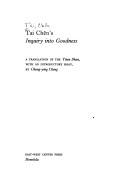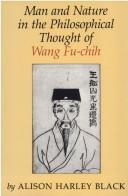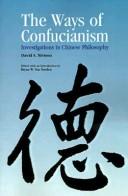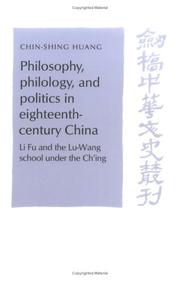| Listing 1 - 10 of 12 | << page >> |
Sort by
|

ISBN: 0824800931 082488082X Year: 1971 Publisher: Honolulu East-West center press
Abstract | Keywords | Export | Availability | Bookmark
 Loading...
Loading...Choose an application
- Reference Manager
- EndNote
- RefWorks (Direct export to RefWorks)
Book
ISBN: 9789004243736 9789004243781 Year: 2013 Volume: 5 Publisher: Leiden Brill
Abstract | Keywords | Export | Availability | Bookmark
 Loading...
Loading...Choose an application
- Reference Manager
- EndNote
- RefWorks (Direct export to RefWorks)
S12/0450 --- S12/0460 --- S13A/0200 --- China: Philosophy and Classics--Ming, Qing: later Confucian teachings, Sacred Edicts (incl. Wang Fuzhi, Yan Yuan, Li Kong, Dai Dongyuan) --- China: Philosophy and Classics--Confucianism: since 1911 (e.g. Liang Shuming) --- China: Religion--General works --- Confucianism --- Religion --- Religions --- Philosophy
Book
ISBN: 023106022X 9780231060226 Year: 1986 Publisher: New York Columbia University Press
Abstract | Keywords | Export | Availability | Bookmark
 Loading...
Loading...Choose an application
- Reference Manager
- EndNote
- RefWorks (Direct export to RefWorks)
"Chiao Hung (1540?-1620) was an important late Ming intellectual associated with trends that were both a radical culmination of Ming Neo-Confucianism and a seedbed of new perspectives leading to the later rejection of Ming thought. This provocative book extends beyond Chiao Hung as an individual and explores the attempt in early modern Chinese history to restructure Neo-Confucianism as an intellectual event. Edward T. Ch'ien articulates the development of central problems in Ming thought, relates them convincingly to the earlier tradition, asserts their originality in Chiao Hung's formulations, and places them in a logical context with later developments. Ch'ien's study focuses on three issues in Chinese intellectual history: Neo-Confucian syncretism, the controversy between Ch'eng-Chu and Lu-Wang schools of Neo-Confucianism, and the emergence of 'evidential research' both as a type of scholarship and as a mode of though. It also clarifies some of the major issues in Chinese intellectual history." -- from book jacket.
Neo-Confucianism. --- Chiao, Hung, --- S12/0450 --- Confucianism --- Philosophy, Chinese --- China: Philosophy and Classics--Ming, Qing: later Confucian teachings, Sacred Edicts (incl. Wang Fuzhi, Yan Yuan, Li Kong, Dai Dongyuan) --- Jiao, Hong, --- Neo-Confucianism, 1540-1644 --- Neo-Confucianism --- 焦竑, --- Jiao, Ruohou, --- Chiao, Jo-hou, --- 焦弱侯, --- Jiao, Danyuan, --- Chiao, Tan-yüan, --- 焦澹園, --- Jiao, Yiyuan, --- 焦漪園, --- Jiao, Taishi, --- 焦太史, --- Chiao, Hung, - 1541-1620.
Book
ISBN: 9622012744 Year: 1983 Publisher: Hong Kong Chinese university press
Abstract | Keywords | Export | Availability | Bookmark
 Loading...
Loading...Choose an application
- Reference Manager
- EndNote
- RefWorks (Direct export to RefWorks)
S12/0430 --- S12/0450 --- S12/0433 --- Neo-Confucianism --- -#SML: Joseph Spae --- Confucianism --- Philosophy, Chinese --- China: Philosophy and Classics--Neo-Confucianists: general and Song (including lixue 理學) --- China: Philosophy and Classics--Ming, Qing: later Confucian teachings, Sacred Edicts (incl. Wang Fuzhi, Yan Yuan, Li Kong, Dai Dongyuan) --- China: Philosophy and Classics--Zhu Xi --- #SML: Joseph Spae

ISBN: 0295963387 Year: 1989 Publisher: Seattle (Wash.) : University of Washington press,
Abstract | Keywords | Export | Availability | Bookmark
 Loading...
Loading...Choose an application
- Reference Manager
- EndNote
- RefWorks (Direct export to RefWorks)
S12/0450 --- China: Philosophy and Classics--Ming, Qing: later Confucian teachings, Sacred Edicts (incl. Wang Fuzhi, Yan Yuan, Li Kong, Dai Dongyuan) --- Neo-Confucianism. --- Wang, Fuzhi, --- Knowledge --- Neo-Confucianism --- Confucianism --- Philosophy, Chinese --- Chuanʹ-shanʹ, Van, --- I-hu-tao-jen, --- Mai-chiang-weng, --- Maijiangweng, --- Ō, Fushi, --- Ō, Senzan, --- Van, Chuanʹ-shanʹ, --- Wang, Chiang-chai, --- Wang, Chʻuan-shan, --- Wang, Chuanshan, --- Wang, Erh-nung, --- Wang, Ernong, --- Wang, Fu-chih, --- Wang, Jiangzhai, --- Yihudaoren, --- 一壺道人, --- 王夫之, --- 王船山, --- 王薑齋, --- 王而農, --- 賣薑翁, --- Neo-confucianisme --- Wang-fu-chih --- Critique et interpretation

ISBN: 081269340X 9780812693409 Year: 1996 Publisher: Chicago (Ill.): Open Court
Abstract | Keywords | Export | Availability | Bookmark
 Loading...
Loading...Choose an application
- Reference Manager
- EndNote
- RefWorks (Direct export to RefWorks)
Confucianism. --- Philosophy, Chinese. --- S12/0400 --- S12/0410 --- S12/0364 --- S12/0430 --- S12/0450 --- S12/0440 --- S12/0213 --- China: Philosophy and Classics--Kongzi 孔子 Confucius and Confucianism --- China: Philosophy and Classics--Xunzi --- China: Philosophy and Classics--Mengzi 孟子 Mencius (incl. works on Mencius ) --- China: Philosophy and Classics--Neo-Confucianists: general and Song (including lixue 理學) --- China: Philosophy and Classics--Ming, Qing: later Confucian teachings, Sacred Edicts (incl. Wang Fuzhi, Yan Yuan, Li Kong, Dai Dongyuan) --- China: Philosophy and Classics--Wang Yangming --- China: Philosophy and Classics--Ethics --- Confucianism --- Philosophy, Chinese --- Chinese philosophy --- Religions

ISBN: 0521482259 0521529468 0511529112 Year: 1996 Publisher: Cambridge Cambridge University press
Abstract | Keywords | Export | Availability | Bookmark
 Loading...
Loading...Choose an application
- Reference Manager
- EndNote
- RefWorks (Direct export to RefWorks)
This book explains the general intellectual climate of the early Ch'ing period, and the political and cultural characteristics of the Ch'ing regime at the time. Professor Huang brings to life the book's central characters, Li Fu and the three great emperors - K'ang-hsi, Yung-cheng, and Chien-lung - whom he served. Although the author's main concern is to explain the contributions of Li Fu to the Lu-Wang school of Confucianism, he also gives a clearly written account of the Lu-Wang and Ch'eng-Chu schools from the twelfth century to the eighteenth. In a clear, succinct style, Huang explains the historical differences between the Ch'eng-Chu and Lu-Wang schools without sacrificing the subtleties of either. The book culminates in a discussion of the hero-emperor K'ang-hsi's appropriation of the 'Tradition of the Way' from his intellectual officials, which denied them their traditional role as moral censors and critics of the emperor's exercise of authority.
Philosophy, Chinese --- Neo-Confucianism. --- Political science --- Philosophie chinoise --- Néo-confucianisme --- Science politique --- Philosophy. --- Philosophie --- Li, Fu, --- China --- Chine --- Intellectual life --- Vie intellectuelle --- S12/0215 --- S12/0450 --- -Neo-Confucianism --- China: Philosophy and Classics--Philosophy of language --- China: Philosophy and Classics--Ming, Qing: later Confucian teachings, Sacred Edicts (incl. Wang Fuzhi, Yan Yuan, Li Kong, Dai Dongyuan) --- Li, Fu --- S12/0240 --- S12/0216 --- -Confucianism --- Administration --- Civil government --- Commonwealth, The --- Government --- Political theory --- Political thought --- Politics --- Science, Political --- Social sciences --- State, The --- Chinese philosophy --- China: Philosophy and Classics--Chinese philosophy: Qing --- China: Philosophy and Classics--Political philosophy --- Philosophy --- 李复 --- 李孚 --- 李富 --- 李復 --- 李甫 --- 犁夫 --- -Administration --- Confucianism --- Arts and Humanities --- History --- -Philosophy
Book
ISBN: 9781438464534 9781438464558 143846455X Year: 2017 Publisher: Albany, New York : SUNY Press,
Abstract | Keywords | Export | Availability | Bookmark
 Loading...
Loading...Choose an application
- Reference Manager
- EndNote
- RefWorks (Direct export to RefWorks)
In this novel engagement with Ming Dynasty philosopher Wang Fuzhi (1619–1692), Nicholas S. Brasovan presents Wang's neo-Confucianism as an important theoretical resource for engaging with contemporary ecological humanism. Brasovan coins the term "person-in-the-world" to capture ecological humanism's fundamental premise that humans and nature are inextricably bound together, and argues that Wang's cosmology of energy (qi) gives us a rich conceptual vocabulary for understanding the continuity that exists between persons and the natural world. The book makes a significant contribution to English-language scholarship on Wang Fuzhi and to Chinese intellectual history, with new English translations of classical Chinese, Mandarin, and French texts in Chinese philosophy and culture. This innovative work of comparative philosophy not only presents a systematic and comprehensive interpretation of Wang's thought but also shows its relevance to contemporary discussions in the philosophy of ecology.
Neo-Confucianism. --- Humanism. --- Philosophy of nature. --- S12/0214 --- S12/0450 --- Nature --- Nature, Philosophy of --- Natural theology --- Philosophy --- Classical education --- Classical philology --- Philosophical anthropology --- Renaissance --- Confucianism --- Philosophy, Chinese --- China: Philosophy and Classics--Philosophy of nature --- China: Philosophy and Classics--Ming, Qing: later Confucian teachings, Sacred Edicts (incl. Wang Fuzhi, Yan Yuan, Li Kong, Dai Dongyuan) --- Wang, Fuzhi, --- Chuanʹ-shanʹ, Van, --- I-hu-tao-jen, --- Mai-chiang-weng, --- Maijiangweng, --- Ō, Fushi, --- Ō, Senzan, --- Van, Chuanʹ-shanʹ, --- Wang, Chiang-chai, --- Wang, Chʻuan-shan, --- Wang, Chuanshan, --- Wang, Erh-nung, --- Wang, Ernong, --- Wang, Fu-chih, --- Wang, Jiangzhai, --- Yihudaoren, --- 一壺道人, --- 王夫之, --- 王船山, --- 王薑齋, --- 王而農, --- 賣薑翁, --- Neo-Confucianism --- Humanism --- Philosophy of nature
Book
ISSN: 01699563 ISBN: 9789004280083 9789004280106 9004280081 9004280103 132212826X 9781322128269 Year: 2014 Volume: 116 Publisher: Leiden Boston :BRILL
Abstract | Keywords | Export | Availability | Bookmark
 Loading...
Loading...Choose an application
- Reference Manager
- EndNote
- RefWorks (Direct export to RefWorks)
In Doing Good and Ridding Evil in Ming China: The Political Career of Wang Yangming , George Israel offers an account of this influential Neo-Confucian philosopher’s official career and military campaigns. While his contribution to China’s intellectual history and the outlines of his political life are well known, the relation between his thought and what he did in his capacity as a Ming official has been given less attention. Prior writing on Wang Yangming has passed judgment on his ideas by either idealizing or condemning him for how he treated those he was assigned to govern. Through a detailed reconstruction of his career in the context of issues of empire, ethnicity, and violence, George Israel demonstrates that the truth lies somewhere in the middle.
Neo-Confucianism --- Wang, Yangming, --- S12/0440 --- S12/0450 --- China: Philosophy and Classics--Wang Yangming --- China: Philosophy and Classics--Ming, Qing: later Confucian teachings, Sacred Edicts (incl. Wang Fuzhi, Yan Yuan, Li Kong, Dai Dongyuan) --- Wang, Yang-ming, --- Ō, Yō-mei, --- Ō, Yōmei, --- Van, I︠A︡nmin, --- Wang, Yang-myŏng, --- 王陽明, --- 王阳明, --- Wang, Shou-jen, --- Wang, Shouren, --- Ō, Shujin, --- Wang, Show-jīn, --- 王守仁, --- Wang, Wencheng, --- Wang, Wen-chʻeng, --- 王文成, --- Wang, Bo'an, --- Wang, Po-an, --- 王伯安, --- Yangming, Wang, --- Yang-ming, Wang, --- Neo-Confucianism. --- Philosophy, Chinese --- Wang, Yang-ming --- Ō, Yō-mei --- Ō, Yōmei --- Van, I︠A︡nmin --- Wang, Yang-myŏng --- Wang, Shou-jen --- Ō, Shujin --- Wang, Show-jīn --- Wang, Wen-chʻeng --- Wang, Po-an --- Yangming, Wang --- Yang-ming, Wang --- Wang, Wencheng --- Wang, Shouren --- Wang, Bo'an --- 王陽明 --- 王阳明 --- 王守仁 --- 王文成 --- 王伯安 --- Wang, Yangming, - 1472-1529
Book
ISBN: 9789004315457 9004315454 9004318739 9789004318731 Year: 2016 Volume: 132 Publisher: Leiden Brill
Abstract | Keywords | Export | Availability | Bookmark
 Loading...
Loading...Choose an application
- Reference Manager
- EndNote
- RefWorks (Direct export to RefWorks)
Yan Yuan (1635-1704) has long been a controversial figure in the study of Chinese intellectual and cultural history. Although marginalized in his own time largely due to his radical attack on Zhu Xi (1130-1200), Yan was elevated to a great thinker during the early twentieth century because of the drastic changes of the modern Chinese intellectual climate. In Body, Ritual and Identity: A New Interpretation of the Early Qing Confucian Yan Yuan (1635-1704) , Yang Jui-sung has demonstrated that the complexity of Yan’s ideas and his hatred for Zhu Xi in particular need to be interpreted in light of his traumatic life experiences, his frustration over the fall of the Ming dynasty, and anxiety caused by the civil service examination system. Moreover, he should be better understood as a cultural critic of the lifestyle of educated elites of late imperial China. By critically analyzing Yan’s changing intellectual status and his criticism that the elite lifestyle was unhealthy and feminine, this new interpretation of Yan Yuan serves to shed new light on our understanding of the features as well as problems of educated elite culture in late imperial China.
S12/0450 --- S02/0210 --- China: Philosophy and Classics--Ming, Qing: later Confucian teachings, Sacred Edicts (incl. Wang Fuzhi, Yan Yuan, Li Kong, Dai Dongyuan) --- China: General works--Intellectuals: general and before 1840 --- Philosophers --- Confucianists --- Radicals --- Elite (Social sciences) --- Civil service --- Elites (Social sciences) --- Leadership --- Power (Social sciences) --- Social classes --- Social groups --- Ideological extremists --- Political extremists --- Extremists --- History. --- Examinations --- Yan, Yuan, --- Zhu, Xi, --- Chu, Hsi --- C̄ū, Hī --- Chu, Hi --- Choo, He --- Tschu, Hi --- Shu, Ki --- Chu, Hy --- Tchou, Hi --- Chu, Hũi --- Tchu-hi --- Zhu, Fuzi, --- Chu, Fu-tzu, --- Choo-Foo-Tze, --- Choo-foo-tsze, --- Chu, Puja, --- 朱夫子, --- Zhu, Zi, --- Chu, Tzu, --- Zhuzi, --- Chu-tzu, --- Chuja, --- Shu-shi, --- Shushi, --- 朱子, --- Zhu, Yuanhui, --- Chu, Yüan-hui, --- 朱元晦, --- Zhu, Zhonghui, --- Chu, Chung-hui, --- 朱仲晦, --- Zhu, Hui'an, --- Chu, Hui-an, --- 朱晦庵, --- Zhu, Huiweng, --- Chu, Hui-weng, --- 朱晦翁, --- Zhu, Dunweng, --- Chu, Tun-weng, --- 朱遯翁, --- Yungulaoren, --- Yün-ku-lao-jen, --- 云谷老人, --- Cangzhoubingsou, --- Tsʻang-chou-ping-sou, --- 沧洲病叟, --- Zhu, Ziyang, --- Chu, Tzu-yang, --- 朱紫陽, --- 朱紫阳, --- 朱熹 --- Yen, Yüan, --- Yan, Xizhai, --- Zhu, Bangliang, --- Siguren, --- Yan, Yizhi, --- Yen, Hsi-chai, --- Chu, Pang-liang, --- Ssu-ku-jen, --- Yen, I-chih, --- 顏元, --- 顔元, --- 颜元, --- Political and social views. --- Criticism and interpretation. --- Adversaries. --- China --- History
| Listing 1 - 10 of 12 | << page >> |
Sort by
|

 Search
Search Feedback
Feedback About UniCat
About UniCat  Help
Help News
News